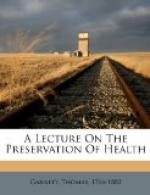It now only remains for me to take some notice of exercise. Of all the various methods of preserving health, and of preventing diseases, which nature has suggested, there is none more efficacious than exercise; it puts the fluids all in motion, strengthens the solids, promotes perspiration, and occasions the decomposition of a larger quantity of atmospheric air in the lungs. Hence, in order to preserve the health of the body, the author of nature has made exercise absolutely necessary to the greater part of mankind for obtaining the means of existence.—Had not exercise been absolutely necessary for our well-being, says the elegant Addison, nature would not have made the body so proper for it, by giving such an activity to the limbs, and such a pliancy to every part, as necessarily produce those compressions, extensions, contortions, dilatations, and all other kinds of motions, that are necessary for the preservation of such a system of tubes and glands.—And that we might not want inducement to engage us in such exercise of the body as is proper for its welfare, it is so ordered, that nothing valuable can be procured without it. Not to mention riches and honors, even food and raiment are not to be come at without the toil of the hands and sweat of the brow. Providence furnishes materials, but expects that we should work them up ourselves. The earth must be laboured before it gives its increase, and when it is forced into its several products, how many hands must they pass through before they are fit for use? Manufactures, trade, and agriculture, naturally employ more than nineteen parts of the species out of twenty; and as for those who are not obliged to labour by the condition in which they are born, they are more miserable than the rest of mankind, unless they indulge themselves in that voluntary labour which goes by the name of exercise.
Of all the different kinds of exercise, there is none that conduces so much to health as riding; it is not attended with the fatigue of walking, and the free air is more enjoyed in this way than by any other mode of exercise. Where it cannot be used, walking, or exercise in a carriage, ought to be substituted.
The best time for taking exercise is before dinner, for the body is then more vigorous and alert, and the mind more cheerful, and better disposed to enjoy the pleasure of a ride or walk. Exercise after a full meal disturbs digestion, and causes painful sensations in the stomach and bowels, with heart-burn, and acid eructations.
But whatever mode of exercise you use, it ought not at first to be too violent. Dr. Armstrong has given us an excellent rule—
’Begin with gentle toils, and as your nerves ’grow firm, to hardier, by just steps aspire. ’The prudent, even in every moderate walk, ’at first but saunter, and by slow degrees ‘increase their pace.’
THE END.
R. NOBLE. Printer,
Old Bailey.
NOTES.




